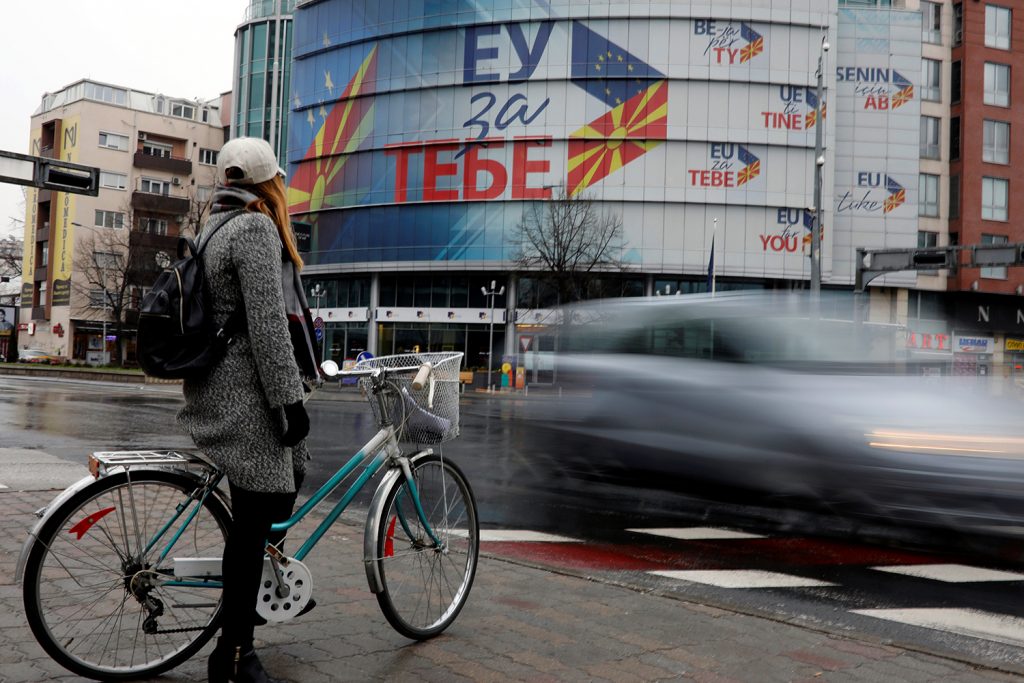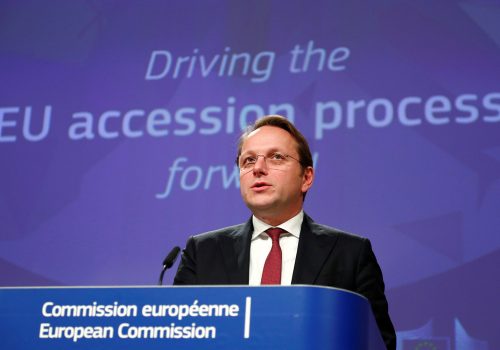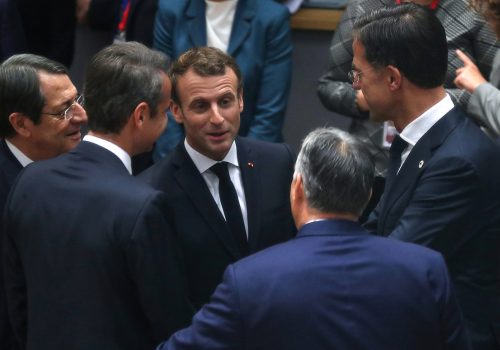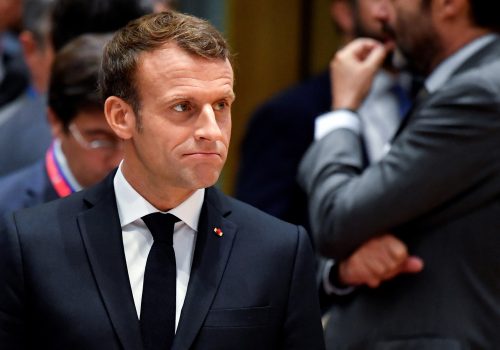EU foreign ministers greenlighted the launch of accession talks with North Macedonia and Albania during a meeting by videoconference on March 24. European officials heralded the decision as a sign that the EU is still able to take strategic decisions, even in times of crisis such as the current coronavirus outbreak.
The much-awaited decision for North Macedonia and Albania comes almost half a year after France, supported by the Netherlands and Denmark, blocked the opening of negotiations at the October 2019 European summit out of a concern for the ability of the EU to absorb new members and what critics saw as the need to reform the enlargement process. The veto triggered a debate about the blow last year’s decision may have dealt to the EU’s credibility in the Western Balkans, the opening it may have created in the region for other geopolitical competitors, and the future of the enlargement process. At the same time, the European Commission and member states moved quickly to overhaul the rules for the Union’s enlargement process and break the deadlock.
The March 24 decision by the foreign ministers sets no specific date for the start of accession talks. It places additional conditions on Albania with regard to the rule of law and anti-corruption measures, which Tirana must meet before negotiations can begin. The decision also still must be approved formally by the EU heads of state and is widely expected to be rubberstamped, even if this formality may be delayed at this week’s European Summit because of an all-consuming focus on COVID-19 crisis management.
The New Atlanticist asked Atlantic Council experts and friends about the EU’s new enlargement negotiations and what impact they may have on North Macedonia and Albania, and the quest for accession in the Western Balkans:
Daniel Fried, Weiser Family Distinguished Fellow with the Atlantic Council’s Future Europe Initiative:
“Amid general coronavirus pessimism (and related fretting over presumed EU dysfunctionality) comes good news: on March 24, the EU’s General Affairs Council [GAC] ministers “gave their political agreement to the opening of accession negotiations” with North Macedonia and Albania. Last October, when French President Emmanuel Macron (joined by the Dutch) blocked accession negotiations, critics charged France (and Europe by extension) with slamming the EU’s door in the face of countries that believed in the EU, effectively ending EU enlargement. This blow came after North Macedonia had made a courageous decision to change its name, ending a bitter bilateral dispute with Greece, partly on the promise that what it lost in nationalist pride, it would gain from a European future. Some critics saw last fall’s blockage of talks as another sign of an inward-looking, selfish Europe, part of a baleful trend of nativism throughout the transatlantic world.”
“Not so fast, as it turns out.”
“Macron asserted at the time that he was not putting a hard stop on EU enlargement but strengthening conditionality, concerned about backsliding among candidate (or newly-admitted) members. Skeptics dismissed this rationale but he seems to have meant it. After months of careful work, a deal got worked out: EU enlargement will be based on “rigorous positive and negative conditionality, and reversibility” (French demands) and “tackling the phenomenon of unfounded asylum applications and ensuring repatriations” (a Dutch concern, especially with respect to Albania), according the GAC draft.”
“The EU can be messy, like any democratic political structure. But it still works. The enlargement decision vindicates Macedonian and Albanian perseverance and the champions of enlargement within the EU who worked out the deal. Enlargement remains for the future, but good steps are what are needed to get there. This was one.”
Dimitar Bechev, nonresident senior fellow with the Atlantic Council’s Eurasia Center:
“The decision by the EU foreign ministers to open accession talks with North Macedonia and Albania is welcome news. It comes at a time when Europe is battling a major public health crisis and is bracing for its economic aftershocks. Keeping enlargement alive speaks volumes about the union’s ability to muddle through. One is reminded of Montenegro, which launched its membership negotiations in June 2012 as the eurozone was hovering on the edge. But the two Western Balkan countries are at the start of a long journey. North Macedonia, which the European Commission deemed prepared to begin talks as early as 2009, would be lucky to make it into the EU before the end of the current decade. Albania, who won’t be given an actual start date this year, would probably take even longer.”
“The destination Skopje and Tirana are heading to remains unclear. They will likely be admitted to an outer circle of a differentiated EU. Integration will no doubt deliver economic benefits but the jury is out whether it could bring about profound political changes. French President Emmanuel Macron is rightfully insisting on a more rigorous approach in the negotiations and the European Commission’s new methodology could give Brussels’ more clout. But ultimately domestic dynamics in North Macedonia and Albania will play a decisive part.”
“The news, coming shortly after North Macedonia’s de facto acceptance into NATO, is positive for the entire Western Balkans. But let’s not get carried away. The EU is still at a loss on how to handle the two difficult cases, Kosovo and Bosnia and Herzegovina. Relations with Serbia, the largest state in the region negotiating its accession since 2014, are not in perfect shape as the authoritarian-minded President Aleksandar Vučić flirts with Russia, and increasingly with China. A decade ago it looked as if the EU would be the only game in town for the Balkans. This is less the case at present.”
Judy Ansley, senior advisor with the Atlantic Council’s Future Europe Initiative:
“This is a long overdue but very welcome decision by the EU—a decision that recognizes and rewards the significant progress both countries have made in implementing reforms and resolving conflicts to advance toward integration with the EU. In particular, former Prime Minister Zoran Zaev’s courageous stance in concluding the Prespa Agreement to resolve the long-simmering conflict with Greece should have been recognized by the EU in October with the opening of accession talks. The EU’s failure last fall led many in the region—and beyond—to question whether there was a viable path forward for EU expansion. The EU’s recent decision sends a strong message to all nations of the Western Balkans that the path to EU membership is open, and that their future lies with the West. It is now up to them to make the needed reforms.”
Valeska Esch, program director for Europe with the Aspen Institute Germany:
“EU member states reaching a consensus on starting accession negotiations with Albania and North Macedonia is a good and long overdue step for both the EU and the Western Balkans. With this decision, the EU has finally demonstrated that it still takes the membership perspective for the Western Balkan countries seriously and rewards reform efforts. This is an important signal for Western Balkan countries and the credibility of their perspectives, and a reaffirmation of the conditionality approach of the accession process. This week’s decision, however, can only be a first step in re-engaging in the region more actively.”
“The EU needs to continue its support for reforms across the region, make use of the revised methodology, closely monitor and strictly assess developments in all countries, reward progress and respond to lack thereof firmly. The spiral of stagnating reforms and backsliding without firm responses by the EU has to end to strengthen the credibility of the process on both sides. This includes the need to finally agree to the long overdue visa liberalization for Kosovo’s citizens.”
“Finally, the EU needs to become engaged again in the dialogue between Kosovo and Serbia. The nomination of Miroslav Lajcak as Special Envoy is a step in the right direction. Now it is up to him to engage with local actors and restart the dialogue, not only between presidents, as was done so far, but with governments, as required by the Kosovar constitution, and societies. To achieve a lasting solution, society-wide agreement in both countries as well as close coordination with EU member states and the United States will be required. Transatlantic cooperation will be essential in finding a sustainable solution to this conflict.”
Olivier-Rémy Bel, visiting fellow at the Atlantic Council:
“March 24’s accession go-ahead by EU foreign ministers, given remotely of course, is a major step for the two countries, North Macedonia and Albania that have worked hard to reach this point.”
“Yet it also reflects well on the EU, further showcasing the nimbleness that it has displayed on other issues such as defense. In mid-October, commentators were alarmed following France’s position in the Council. By December, a productive dialogue was underway between the Commission and member states, which resulted in a new methodology, largely inspired by the French December non-paper, being presented in February. In five months, in the middle of a leadership transition (and a coronavirus outbreak), the EU was able to have a hard and productive look at a highly political issue and come up with a compromise. It was able to challenge a process that had become too administrative and made it more political. The coming years of negotiations will tell us how deep a reform this is but, if anything, Europe’s ability to work rapidly and competently through the sequence should be put to its credit.”
“For North Macedonia and Albania, much lies ahead. The recently adopted Council conclusions place further preconditions on Albania, notably relating to electoral reform, the rule of law, and fighting corruption. Now the Commission needs to present a framework for negotiations before the intergovernmental conference can take place. Talks will likely last years and, if the new methodology is being applied, backsliding will mean delaying further potential accession. Sustaining domestic political momentum will be key—though the new process, which frontloads some of the benefits, might help. Yet candidate countries would also be wise to use this time to canvass the public opinions of member state. Complementing the too often heard defensive narrative—e.g. countering Russia and China or controlling migration—with a positive case detailing what they are bringing to the European Union would serve them well down the road.”
Damir Marusic, nonresident senior fellow with the Atlantic Council’s Future Europe Initiative:
“The news that the EU is opening accession talks with North Macedonia and Albania is of course welcome. Signs of normalcy are hard to come by these days, and nothing is more normal than the sight of Brussels committing itself to a process—enlargement—that has in many ways defined the EU since the end of the Cold War.”
“But like with so much happening today, we should not be seduced by the sight of something familiar into concluding that we are back to “normal.” Before the coronavirus upended everything, French President Emmanuel Macron rattled the European establishment by blocking the opening of talks and demanding a more “political” protocol for enlargement—a euphemism of sorts for what amounts to full reversibility of the process—be adopted in exchange for lifting his veto. Macron got everything he wanted and green-lighted accession earlier this year. The end result, however, is that the opening of accession talks, largely a symbolic gesture anyway given how countries like Turkey and Serbia have been caught in limbo for years, has had even its meager symbolism degraded.”
“On the merits, North Macedonia has been ready for years to start, and given its recent reforms by all rights deserves a shot at being in the club as much as neighboring Bulgaria. Given how small a country it is, perhaps it could even sneak through before the decade is out. Albania, however, faces a much steeper climb, and underscores how little this week’s milestone actually means. The Dutch, who were most opposed to even starting the process with the Albanians given concerns about organized crime, were mollified by assurances that the revised protocol all but assures Albania will be kept out. Even the announced opening of the process with Albania has several preconditions attached.”
“Since Macron’s veto, there has been a lot of discussion about what alternatives to enlargement in Europe’s periphery could look like. It’s high time some of these visions be fully fleshed out and institutionalized. A “European” future remains inevitable for the Western Balkans by sheer force of geography alone. But with full membership increasingly a non-credible prospect, the EU needs to spell out the benefits close integration with the core will bring. With China and Russia already deeply engaged in the region, it fails to do so at its own peril.”
Molly Montgomery, vice president at the Europe practice of the Albright Stonebridge Group:
“Albania and North Macedonia’s opening of EU accession talks—and North Macedonia’s imminent NATO membership—are indisputably positive steps toward fulfilling the Euro-Atlantic aspirations of the Western Balkans. However, the EU’s delay in approving this step, and the competing visions for the body’s future that it revealed among member states, have caused many in the region to question whether the European project remains alive for them. Other factors, such as a perceived lack of solidarity between EU member states and aspirant countries in the face of the coronavirus pandemic, have further damaged the EU’s credibility with publics in the region.”
“In a February 18 speech, EU Commissioner for Enlargement and Neighborhood Policy Oliver Varhelyi said the Commission’s top priority must be to win back the trust and confidence of both member states and aspirant countries in the enlargement process. This is the right approach. However, the world looks different now than it did then, and the mileposts he outlined—beginning accession negotiations by the Zagreb summit planned for May and launching there an economic and investment plan for the region—will almost certainly slide further into the future. However, the EU cannot afford to let the Western Balkans slip to the bottom of its agenda for long without risking a permanent loss of confidence and credibility, which would only be detrimental to its own security and prosperity and that of the region.”
Jörn Fleck is an associate director in the Atlantic Council’s Future Europe Initiative.
Further reading:
Image: A girl stands with her bicycle near the offices of the Delegation of the European Union to the Republic of North Macedonia, covered with logos reading "EU for You" in different languages, in Skopje, North Macedonia March 24, 2020. REUTERS/Ognen Teofilovski



